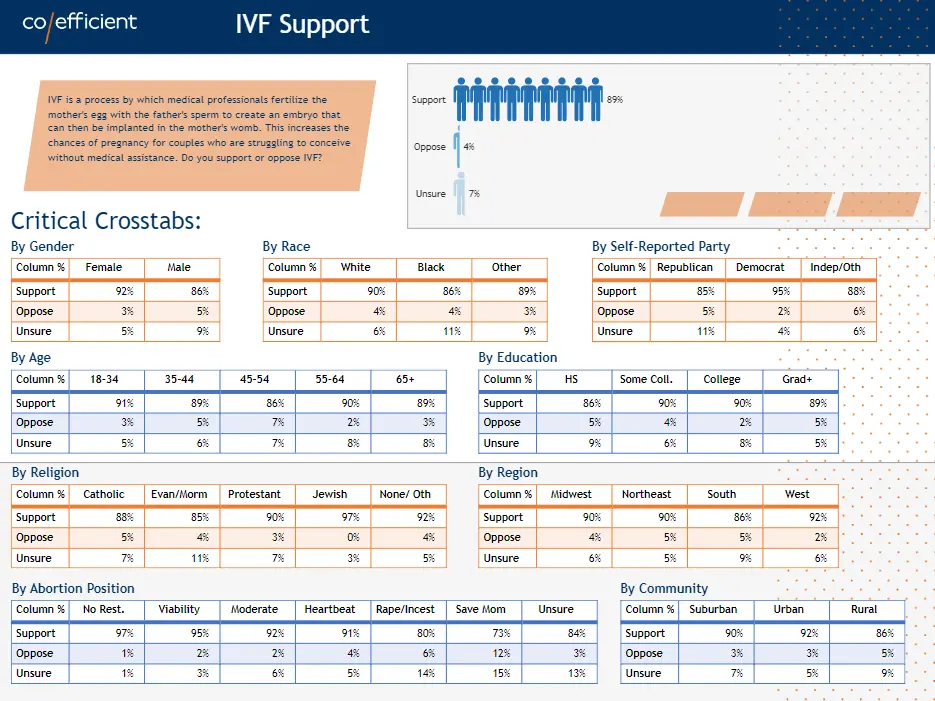Americans for IVF, a self-described “coalition of experts and advocates dedicated to advancing the accessibility and understanding of In Vitro Fertilization (IVF) across the United States” released new polling data on Thursday, showing that a majority of Americans support mandated insurance coverage for IVF.
The national poll was conducted in early October and garnered responses from 2,180 likely voters. Of those surveyed, 89 percent said that they support IVF treatment, while 70 percent said that they would support federal legislation requiring private insurance companies to cover IVF treatment.

Cross tabs from the national poll.
When divided along party lines, 58 percent of Republicans would support such legislation compared to 84 percent of Democrats and 66 percent of Independents. According to the poll, 55 percent of voters would be more likely to vote for a congressional candidate who says they support such legislation.
In the race between former President Donald Trump and Vice President Kamala Harris, the respondents seemed to slightly favor Harris on the issue. 47 percent of voters said that they trusted Harris to fulfill promises on IVF while 45 percent said the same about Trump.
This new data tracks with previous polling conducted by Americans for IVF across Michigan, Pennsylvania, and Wisconsin earlier in September. That polling had also found around 90 percent support for IVF and nearly 70 percent support for mandated insurance coverage of IVF procedures.
These polls indicate popular support for legislation like the HOPE with Fertility Services Act, a bipartisan bill with 28 cosponsors in the House of Representatives that would require private insurance to cover infertility treatments including IVF.
“This polling overwhelmingly shows that voters across the political spectrum strongly support expanding access to affordable IVF treatment no matter a family’s income or zip code,” Rabbi Moshe Margaretten, chairman and president of Americans for IVF, said in a press release. “This data coincides with both presidential candidates and numerous members of Congress also expressing strong support for affordable IVF access, demonstrating that there’s a rare opportunity to expand healthcare access on a bipartisan basis. We encourage Congress to match campaign rhetoric with action by passing the bipartisan HOPE Act.”
“Millions of Americans dream of having a family and becoming a parent,” added Barbara Collura, president of RESOLVE: The National Infertility Association. “Americans for IVF’s new poll results show what RESOLVE has known for decades — expanding access to this vital reproductive healthcare is enormously popular with people across the country, regardless of political beliefs. RESOLVE will continue to push Congress to pass the HOPE Act and help make it easier for people of all backgrounds to build their families.”
In September, Dr. Kaylen Silverberg, M.D., the Medical Director at Texas Fertility Center and the Advisory Board Chair for Americans for IVF, spoke with APR about the HOPE Act.
“We’re trying to make IVF access include everybody in the United States. We’re just trying to expand access so that anybody who is infertile who has been trying for pregnancy can access fertility treatment… and we’ve got several different mechanisms in place to make that happen,” Silverberg told APR.
“We encourage insurance companies to live up to their financial responsibility, but in the event the insurance companies don’t, then we would like the government to step up… the cost [of insurance companies covering all fertility treatments up to, and including, IVF] would be 56¢ per member, per month,” Silverberg said.
According to an independent economic analysis commissioned by Americans for IVF, the HOPE Act would raise individual private insurance premiums by only around $0.58 to $0.79 per month. Additionally, the report found that “when factoring in dynamic scoring considerations” the HOPE Act could “increase federal revenue by at least $212 million over the first 10 years, and $119 billion over a 70-year timeline, with ongoing annual revenue increases of $1.1 billion in current dollars.”
The new polling comes in the wake of the U.S. Supreme Court’s decision earlier this week to deny an Alabama IVF clinic’s appeal of the landmark Alabama Supreme Court ruling that frozen embryos used in fertility treatments are to be legally considered human beings. The Mobile-based Center for Reproductive Medicine filed the appeal in an attempt to prevent a wrongful death claim from moving forward after a couple’s frozen embryo was destroyed at the facility.
Since the Alabama Supreme Court upheld the couple’s wrongful death claim in February, IVF access has developed into a salient political issue with potential ramifications for November’s election results.















































